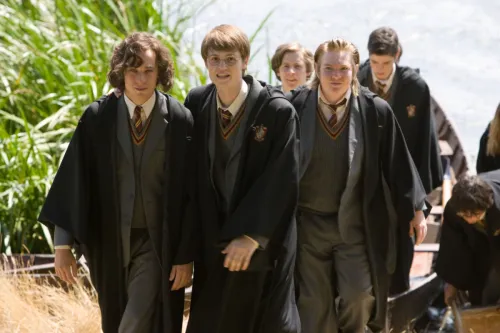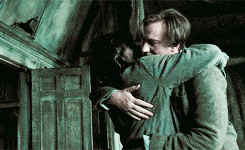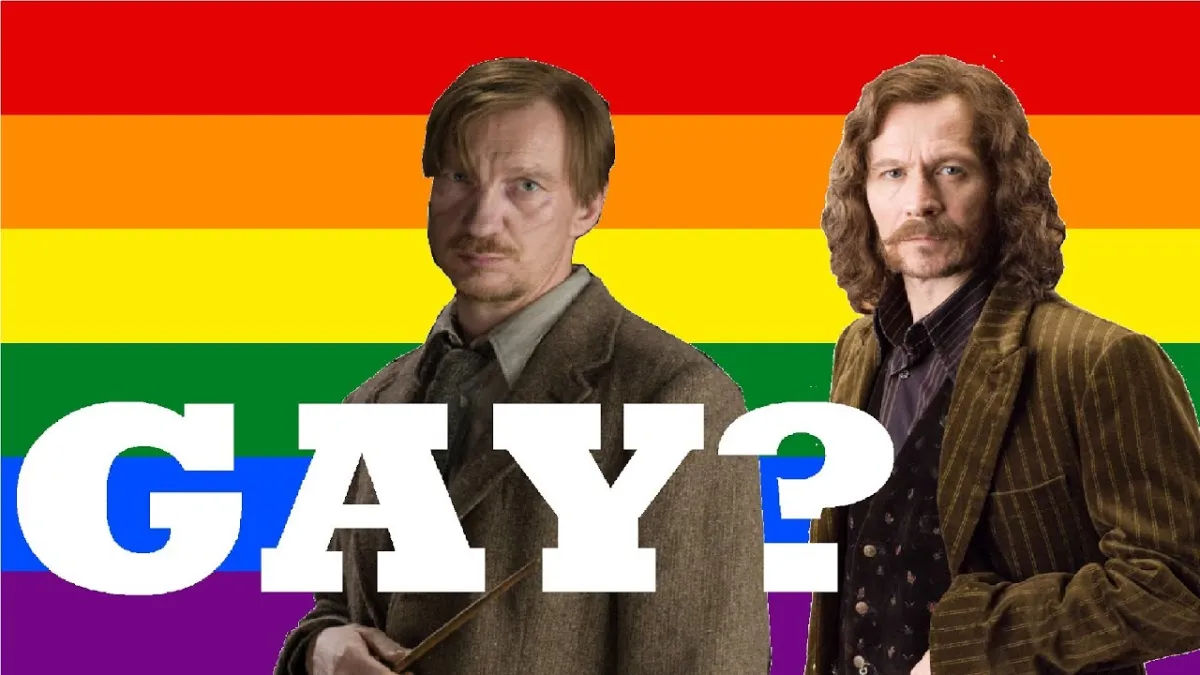Actor and original Harry Potter embodier Daniel Radcliffe would love to see a Marauders-focused TV series. This is a brilliant concept for many reasons—especially because it could provide an opportunity for the kind of queer representation that Harry Potter fans have been clamoring for since The Prisoner of Azkaban was published in 1999.
First, some background: Radcliffe recently spoke to the idea that he’s certain we’ll have Harry Potter movie reboots in the future. He also believes that there are additional Potterverse stories that would lend themselves to an extended medium like television. Per TV Guide:
“I feel like there are other stories from that world that you could absolutely turn into a TV series, 100 percent,” [Radcliffe] said. When prompted for what he’s most eager to see of all the wizarding history author JK Rowling’s laid out, he leapt to the Marauders: “A series with the older generation, that could be very cool.”
Daniel Radcliffe is speaking our language. “The Marauders” was the self-appointed schoolboy nickname for the group of friends that comprised Harry’s good-bro father James Potter, James’ Byronic best friend Sirius Black, sensitive werewolf Remus Lupin, and future dirty rat Peter Pettigrew.
Fan favorites from the start, Harry Potter aficionados have never been satisfied with the spare amounts of Marauders content they were afforded. They’ve been embellishing the Mauraders’ lives with fanfiction, fanart, videos and films, and endless “fanon,” or fan canon, since their introduction in Prisoner of Azkaban.

Brash, adventurous, and extremely close at school, the post-Hogwarts era would see these tight-knit friendships turn tragic. James and his wife Lily are killed defending baby Harry after Peter betrays their location to Voldemort; Sirius is framed for that betrayal and the resulting fallout, sentenced to the dread wizarding prison Azkaban; Peter has faked his own death, masquerading as Ron’s pet rat Scabbers; Remus Lupin is left alone, grappling with the ruins of his world, until Dumbledore brings him back to Hogwarts more than a decade later to teach Defense Against the Dark Arts.
We know that the Marauders end in tragedy, and that tragedy further strikes Remus and Sirius as the books progress. But there is space for a fascinating time in Potterverse history that has never been explored in-depth in canon before—and it would provide a canvas for poignant stories to be told on TV.
The Marauders graduate in 1978, Harry is born in 1980, and by 1981, the group is demolished. Therein we have three years, set at the end of the tumultuous ’70s into the early ’80s (I like to imagine these folks were into the U.K. punk rock scene), when the four men, Lily Potter née Evans, and other attendant pals from Hogwarts are setting out on their own. They’re young, hip, and all-powerful magic-wielders (who can shapeshift into animals as a fun bonus), so there’s a surfeit of potential plots.
As far as we know, none of them were gainfully employed, but they weren’t sitting idly by: they graduated into a time of the wizarding world falling under the Dark Lord’s fascist sway. The Marauders and company were determined to take a heroic stance against Voldemort and his Death Eaters, which would make a show about their lifestyle not exactly the stuff of Friends or even The Magicians.
“They’re all 18-year-old antifa,” a friend and Marauder canon expert I consulted for this article commented drily. “They left high school and became paramilitaries.”
Would there be a better pitch for a show in this day in age than disaffected youthful stealth wizard activists battling wizard fascists? No, no there would not. As an overarching concept, the Marauders are nearly perfect as they are—the scripts write themselves. So how do we arrive at the opportunity for queer representation, and for more diversity overall?
Since Azkaban‘s publication, a segment of Harry Potter readership has viewed Remus Lupin as a queer character. J.K. Rowling, heavy-handed as always, would go on to say that Lupin’s lycanthropy was a metaphor for the social stigma around HIV/AIDS—somewhat unhelpfully, as she later denied that his sexual identity was aligned with the communities that bore the brunt of this stigma. This could have been a far more effective teaching moment for ’90s kids and beyond, as the Harry Potter heroes embrace Lupin and only the bigoted shun him.
The reading of a queer Lupin was not an entirely fan-generated frenzy; this perception extended into film. In an article on Harry Potter fanfiction character tropes that I wrote for The Awl, I explained the origins:
Lupin’s depiction as having an alternative lifestyle secret he could not let others discover for fear of losing his teaching job led many readers to interpret that the Azkaban character was coded gay. The text, the character’s portrayal by moustachio’d actor David Thewlis and a winking film interpretation from director Alfonso Cuarón provided some meaty subtext.
“This time tomorrow, the owls will start arriving from parents…They will not want a werewolf teaching their children, Harry.” — Harry Potter and the Prisoner of Azkaban
No matter that Lupin marries heterosexually later on. No matter that Rowling would declare post-series that Albus Dumbledore was the only trademarked Harry Potter homosexual: in a case of life imitating sub-textual reading, Thewlis revealed in 2011 that, up until the whole marrying a lady thing, he’d been playing Lupin as a “gay junkie” throughout the film versions since Cuarón first suggested it.

In the text, Remus and Sirius embrace after the messy misconceptions of Azkaban are unpicked and it becomes clear that neither betrayed the other or their friends. From there, the shipping of Remus/Sirius—or “Wolfstar,” as it is popularly known—was off and loping.
Sirius: You know the man you truly are, Remus! This heart is where you truly live! This heart! Here! — Prisoner of Azkaban movie script
They defend each other at all costs; a series of events later, and they’re officially living together.
“Sirius, I need you to set off at once. You are to alert Remus Lupin, Arabella Figg, Mundungus Fletcher — the old crowd. Lie low at Lupin’s for a while; I will contact you there.” — Harry Potter and the Goblet Of Fire
These instructions — “Lie low at Lupin’s” — spoken by Dumbledore, have become a fannish hallmark and spin-off genre all their own, a designated spot in the canon space-time continuum where the two men are holing together for sure. (Later they go on to gift Harry with a joint Christmas present.) […] Depending on which pocket of the Internet you’re in, Sirius and Remus were either long together or discovered romance at reunion.
The pairing has become such a part of Harry Potter lore that last year The Paris Review published a deep dive into one writer’s experience, called “Harry Potter and the Secret Gay Love Story.” Frankie Thomas posited that reading between the lines of Remus/Sirius taught a generation of queer-content-inclined kids how to find representation in spaces where it was not overtly stated:
You could be forgiven, though, for having blinked and missed the point in your own reading. Sirius and Lupin are minor characters, and everything we learn about them is filtered through the point of view of Harry, who is, like most kids, too self-involved to notice anything that doesn’t directly affect him. Queer kids, however, were directly affected by the suggestion of a gay love story happening in the background of Harry’s life—and so we noticed it. Oh, did we ever.
J.K. Rowling later wrote in a romance and marriage for Remus with a funky witch named Tonks. I like Tonks as a character, but even viewing their relationship without the Remus/Sirius lens, it often comes across as awkward and rather out of the blue. I feel that it’s shoehorned in primarily to create Teddy Lupin, their orphaned son who Harry takes in to provide the family he never had when he was in Teddy’s position.
Both Remus and Tonks die at the Battle of Hogwarts, after which Remus is seen … as a ghostly form at Sirius’ side who assists Harry along with Lily and James at the climax of The Deathly Hallows. In the end, after death, the whole band is back together.
Remus’ marriage to Tonks doesn’t preclude him from having a queer identity in a theoretical Marauders series, of course. Remus—and Sirius, for that matter—could easily exist on a broad spectrum of sexuality, and a young Marauders show would allow them to explore their identities at an age when such things are common: 18-21, university years elsewhere, as the wizarding world makes no mention of higher education beyond Hogwarts.
Sticklers for canon wouldn’t really have a leg to stand on when it comes to queering the Potterverse in future properties. Rowling is known for retconning canon, as in her infamous announcement about Dumbledore’s sexuality after the books were published; she’s constantly adding and amending more information, to fans’ delight and chagrin. These days, chagrin tends to outweigh delight, like the reveal that Voldemort’s snake Nagini was a cursed Asian woman all along. It’s become a popular Internet meme that Rowling will chime in with too much information unprompted, alongside attempts at “retroactive representation”:
no one:
jk rowling: the basilisk was actually an animagi and had a secret love affair with moaning myrtle. her murder was a crime of passion
— emily (@pctterdiaries) February 9, 2019
jk rowling: why yes, maybe I did write hermione as black and just never mentioned it in the text because that’s the kind of subtle writer I am
also jk rowling: Kingsley Shacklebolt, a BLACK man who was BLACK, had a gold earring and a shaved head, which was also black
— Anne Thériault (@anne_theriault) February 7, 2019
Yet Rowling’s seeming willingness to adjust canon means there’s a real chance to showcase much-needed representation in a more productive fashion going forward. That could mean earning back the trust of disparate communities. LGBTQ+ fans feel cast adrift anew by recent developments: we were never mentioned in-text, and even now Dumbledore’s sexuality continues to be danced around in the Fantastic Beasts franchise. Worse, the crime of casting alleged abuser Johnny Depp as the former object of Dumbledore’s affection was committed, made unconscionable when they already had Colin Farrell right there.
If we were ever to see a Marauders series, a good deal of canon would need to be finessed to begin with: would we really have an all-white, all-straight main cast of characters fighting fascism? It hurts my head to even type that sentence. Bringing Remus and Sirius out of subtext, and allowing the characters to be from a diversity of backgrounds, would be the most magical act that I could imagine the Potter franchise undertaking when it comes to their established characters.
Of course, Daniel Radcliffe’s wish for a Marauder show—and my own—does not mean we’ll receive any such production. But this is the golden age of television, where streaming networks in particular are pouring resources into all kinds of content. Can it really be long before we have some version of the wizarding world on the smaller screen? I don’t believe so. If I were a media executive—or if I were J.K. Rowling—the place that is primed to mine for commercial value and desperately hoped-for representation would be in Messers Mooney, Wormtail, Padfoot, and Prongs.
The non-wizarding world has changed. Many old-school fans of the Marauders are now parents themselves, keen for their children to see the clear-cut queer characters in-book and on-screen that we did not get to experience. And many of us still want this for ourselves.
I know several people who remain involved in Remus/Sirius communities, twenty years after Azkaban. There are more than 13,000 stories on Archive of Our Own tagged with Remus and Sirius as a couple, the most recent of which was published today. Wolfstar is still very much alive, and they’re ready for a new incarnation. Television could do them the justice that the Harry Potter series tried, unsuccessfully, to strike from the reading.
(image: screengrab from Are They Gay? Remus/Sirius edition, Warner Bros.)
Want more stories like this? Become a subscriber and support the site!
—The Mary Sue has a strict comment policy that forbids, but is not limited to, personal insults toward anyone, hate speech, and trolling.—









